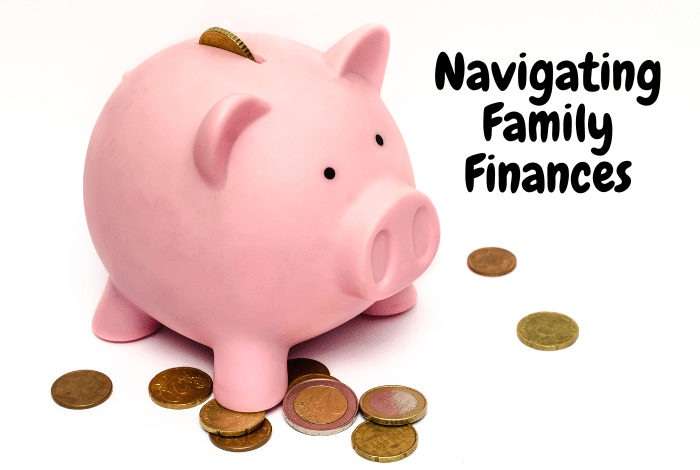In a world where financial challenges are inevitable, families often find themselves facing the daunting task of managing debt while striving to provide for their loved ones. Dealing with debt as a family can be a stressful journey and can put a strain on even the strongest of family units. However, it can also be an opportunity to strengthen bonds, enhance communication, and work towards a more secure financial future. This article will explore essential tips to help families navigate their finances and tackle debt collectively.

Open and Honest Communication
Effective communication is the cornerstone of any successful family endeavour, especially when dealing with financial challenges. Create a safe space for discussing money matters only and honestly, and encourage each family member to share their financial concerns, aspirations, and ideas without fear of judgement. Regular meetings dedicated to discussing family finances can give everyone the freedom to bring up any issues or concerns, which can foster a greater sense of understanding and collaboration. This can help you answer any debt-related questions you may have such as: What is a Trust Deed?
Assess the Situation
To develop a plan for tackling family debt, you’ll need a clear understanding of your financial situation. Start by compiling a list of all your debts, including all credit card balances, loans, mortgages, and any other outstanding obligations. Then, calculate interest rates, minimum payments, and due dates. This information will help you prioritise which debts to address first and make informed decisions about repayment strategies. Assessing your financial situation together will also ensure everyone has a solid understanding of where you stand financially.
Set Realistic Goals
Determine your family’s financial goals and aspirations to set realistic goals. Do you aim to become debt-free within a certain timeframe? Are you saving for a major purchase or planning for the future? Setting financial goals that are realistic and achievable can help motivate you and guide you as you navigate your debt management journey. Having an emergency fund in place can also provide some peace of mind in the event of an unexpected expense and prevent you from borrowing money to cover the cost.
Create a Budget Together
Crafting a budget as a family is essential for effective debt management. Sit down together and outline all income sources and expenses, making an effort to categorise expenditures into essentials, such as housing, groceries, and utilities, and non-essentials, like entertainment, subscriptions, and dining out. By identifying areas where you can cut back, you can allocate more funds towards debt repayment and avoid spending outside of your means. When creating a family budget, make sure to take everyone’s financial obligations into account. From activities and transport to childcare and fuel, having a clear picture of how much each person spends can help you create a budget that works for everyone.
Prioritise Debt Repayment
Debt comes in various forms. Some have higher interest rates, making them costlier over time, while others have a higher principal balance, meaning you’ll pay less over time. There are various methods better equipped to deal with different types of debt. The avalanche method involves paying off debts with the highest interest rates first, while the snowball method focuses on paying off the smallest debts first for a much-needed boost of motivation. Choose the strategy that best aligns with your family’s preferences and financial situation.
Consider Your Options
Explore your options for dealing with debt as a family, such as consolidating your debts or entering into a debt solution. Don’t hesitate to negotiate with creditors for better terms, reduced interest rates, or extended payment plans. Most creditors will be willing to work with families facing financial challenges, as long as you’re proactive about seeking a mutually beneficial solution. The sooner you explore your options, the sooner you can get to the root of your debt problem and fix your financial situation for good.
Create an Emergency Fund
Financial setbacks can happen unexpectedly, so establishing an emergency fund is crucial to avoid accruing more debts in times of crisis. Set money aside on a regular basis and aim to save between three and six months’ worth of living expenses in a separate savings account. Having this financial safety net can provide some much-needed peace of mind and prevent the need to rely on credit when faced with unexpected expenses. When it comes to navigating family finances, planning and preparation are key.
Get Everyone Involved
Dealing with debt often requires you to make temporary lifestyle adjustments. Discuss and agree on changes that everyone can contribute to. This might include cutting unnecessary expenses, finding more cost-effective entertainment options, or seeking ways to reduce your utility bills. When everyone participates, the debt burden can become lighter, and the journey to a debt-free life becomes a shared commitment. The more everyone knows about family finances, the more everyone can chip in and find a solution.
Celebrate Milestones
As you make progress towards paying off your debts and achieving your financial goals, don’t forget to celebrate your milestones as a family. By acknowledging the hard work, discipline, and sacrifices you’ve made together, you can reflect on how far you’ve come and look ahead to the future. Celebrations can be simple and cost-effective, such as a homemade dinner, at-home movie night, or family outing that doesn’t strain your budget.
Seek Professional Help
Consider seeking advice from financial professionals if your family’s financial situation feels overwhelming or complex. From a financial advisor to a debt charity, they can offer tailored advice to help you develop a comprehensive debt management plan that aligns with your family’s unique circumstances. Dealing with debt can be daunting, and it can be tempting to suffer in silence. However, there is help available and ignoring the problem will only lead to your financial situation getting worse.
Tackling family debt requires unity, understanding, and a strategic approach. By fostering open communication, setting clear goals, and prioritising debt repayment, your family can navigate financial challenges together. Remember, this journey is an opportunity to strengthen your bonds, learn valuable skills, and work towards a more secure and debt-free future.
Don’t miss out on future posts like this – receive updates directly to your inbox by email by adding your email address here and hitting subscribe. You can also follow me on Twitter or BlogLovin and I’d love to see you over on my Facebook page and on Instagram. If you’re interested, you can find out more about me here and while I’ve got your attention, if you’re wondering why some of my posts lately are a little bit less frugal then have a read of this post.
This is a collaborative post.








 Logging you in...
Logging you in... Loading IntenseDebate Comments...
Loading IntenseDebate Comments...

tunnel rush · 64 weeks ago